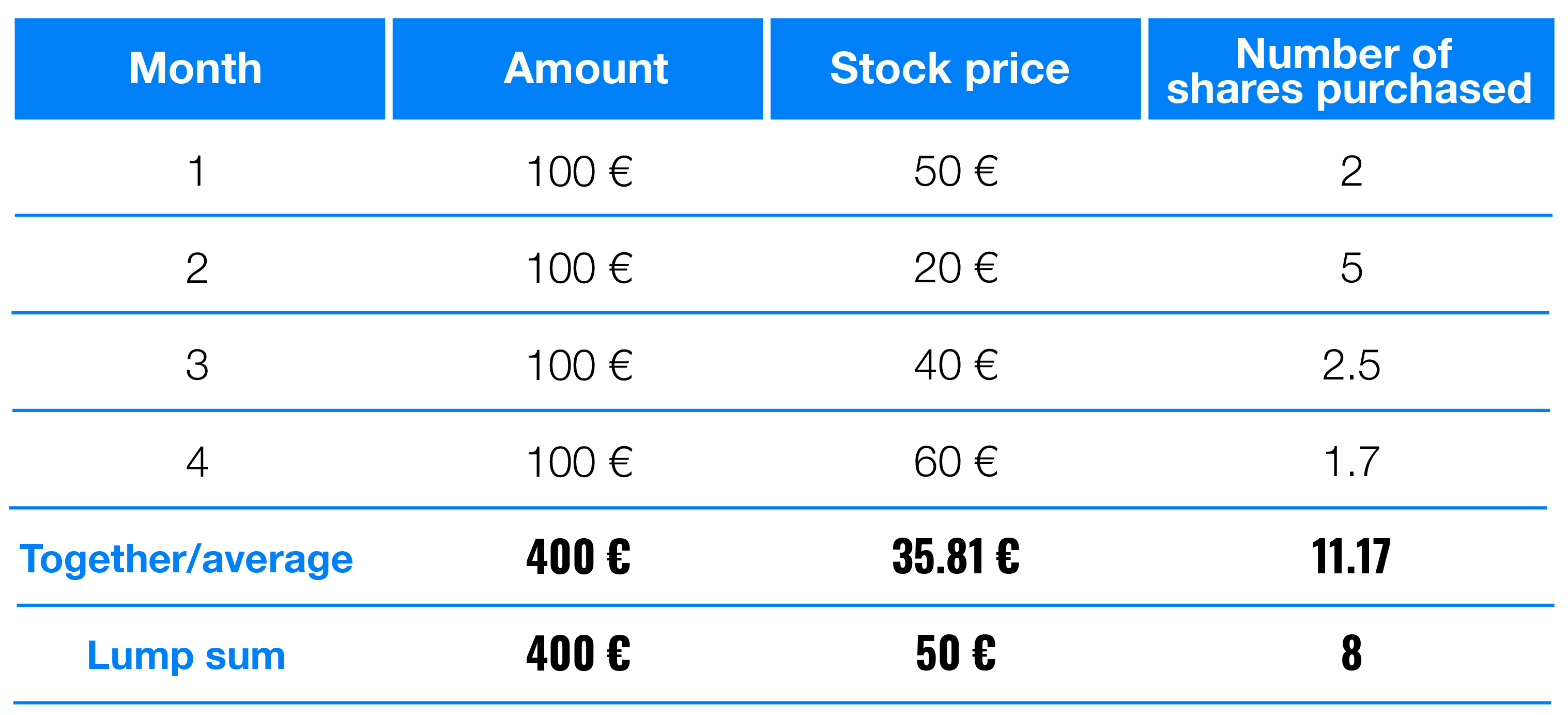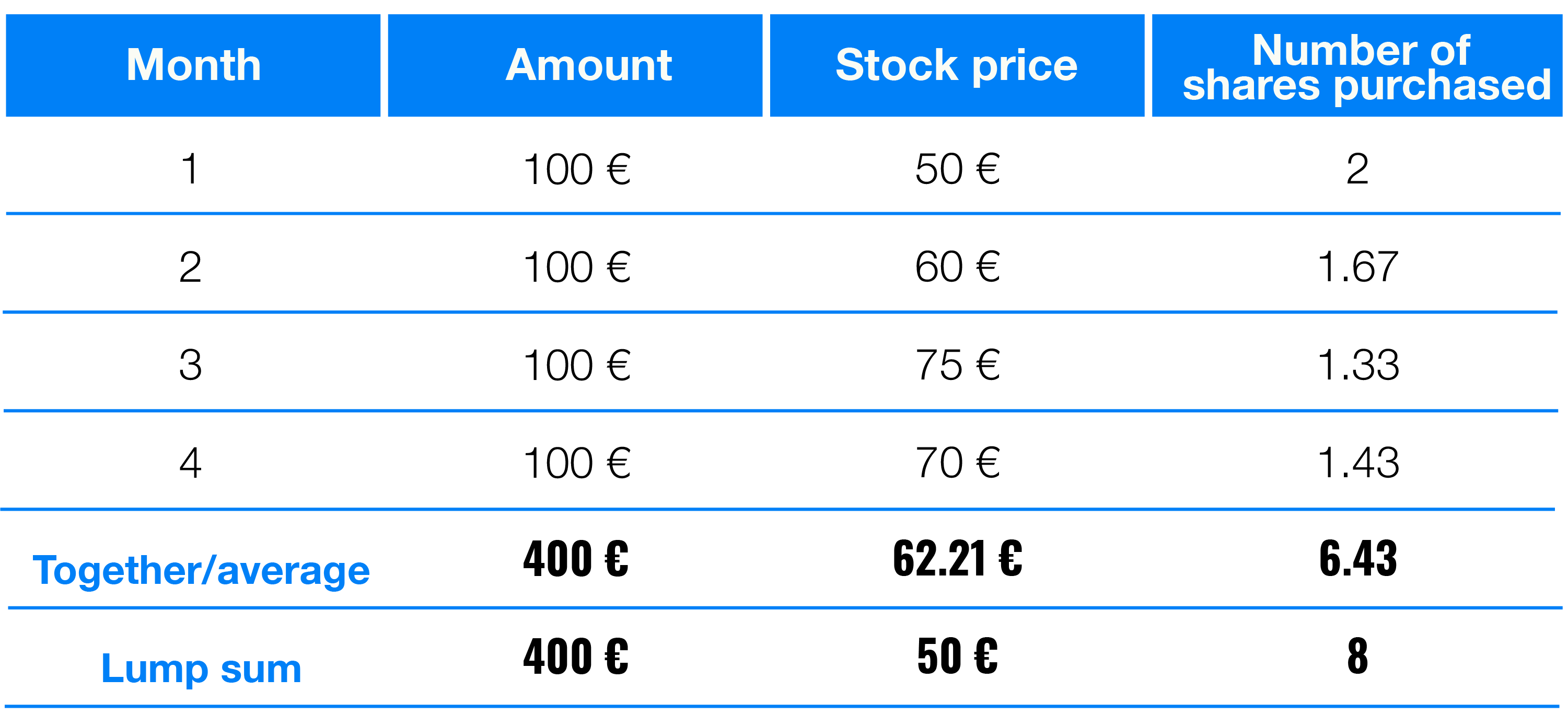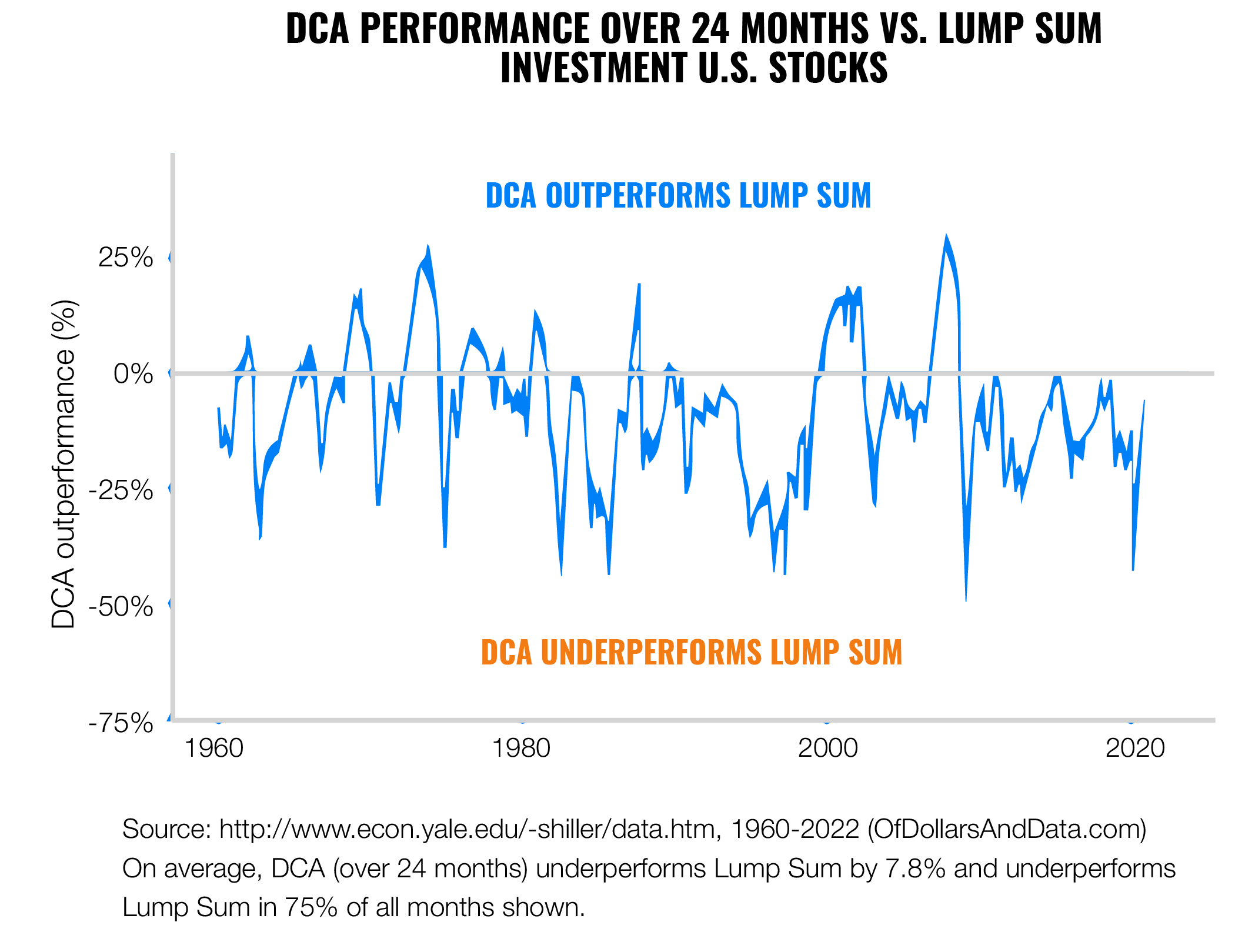What is Regular Investing?
Regular investing, also known as dollar cost averaging (DCA), involves investing a fixed amount of money at regular intervals, usually monthly or quarterly. This approach is based on the idea that regular investing, regardless of market conditions, can help smooth out the ups and downs of the stock market.
For example, let's say you decide to invest €500 a month in a mutual fund. If the price of the fund is up one month, you buy fewer shares. If the price is down the next month, you buy more shares. Over time, this can help reduce the impact of market volatility on your investment returns.
This approach can be particularly beneficial when the market is at its peak and we would be buying at high prices. We must remember that our returns or losses are made up of the differences between the prices for which we buy securities and those at which we later sell them. Therefore, spreading out our investments can theoretically ensure that we avoid buying overpriced stocks and 'average out' our costs.
At the same time, regular investment allows us to invest even when the market is at its bottom and allows us to benefit from the growth of the financial markets in the future. Such an approach is close to most of us to some extent. For many smaller investors, regular investing from their monthly salaries is natural, as they do not have much savings.
What is Lump Sum Investing?
Lump sum investing, on the other hand, involves investing the entire amount saved at once in a particular investment instrument or portfolio of instruments. This approach may be attractive to investors with a larger amount of money to invest at once or who want to take advantage of a particular financial market opportunity.
For example, if you come into a large sum of money, such as an inheritance, a bonus at work, or profits from a business, you may decide to invest it all at once. Alternatively, if an investor believes that a particular stock or market is undervalued, they will take advantage of its potential with a one-off investment.
Advantages and Disadvantages of Regular Investing
One of the biggest advantages of regular investing is that it can help reduce the impact of market volatility on your investment returns. By investing a fixed amount of money at regular intervals, you end up buying more shares when prices are low and fewer shares when prices are high. This can help even out your returns over time and reduce the risk of losing money when the market falls.

The averaging of the price is also illustrated by the following graph of an investment of €10 per month in one instrument with a changing price over 10 months. This is exactly the goal of regular investing, i.e. to reduce the average purchase price by repeated purchases when the instrument is in a downward trend.

Another benefit of regular investing is that it can help build discipline and consistency in your investment strategy and a useful habit of setting aside a portion of your income each month. If you commit to investing a fixed amount of money each month, you are more likely to stick to your investment plan and avoid the temptation to make impulsive investment decisions.
This approach is both intuitive and practical for people who don't have a lot of start-up capital and are more likely to invest funds from their income.
However, one of the potential drawbacks of regular investing is that if the market keeps rising, you may miss out on potential gains. In a bull market, investing every month can lead to buying at ever-higher prices, which leads to missed opportunities to make profits.

As shown in the table and chart of the same regular investments as in the previous case, but this time with different instrument development, regular investing is not a guaranteed key to higher returns. As long as the instrument or the markets are rising, by investing regularly the investor increases his average purchase price.

In both cases, the price of the instrument at the beginning of the period was 10 euros and at the end of the period was 13 euros, only its evolution during the 10 months was different. However, regular investing led to diametrically different purchase prices.
It is important to note here that, historically, markets have more often risen, as the following chart summarising the annual stock market appreciations shows. Between 1926 and 2014, markets rose in 73% of the years. According to this statistic, we would only be able to lower our purchase price by spreading our investment over the year in roughly a quarter of the years.

Advantages and Disadvantages of Lump Sum Investing
One of the biggest advantages of lump sum investing is that it allows you to take advantage of potential market opportunities. For example, if the market takes major downturn years down the road, you get the chance to buy securities into your portfolio at extraordinarily low prices. By investing more during bear markets, you can kick in a lifetime of returns.

As we wrote in the previous section, with longer investment horizons, most periods in the market are growth periods. Therefore, the best prices are offered at the beginning of the investment period before the market "grows" out of them. By buying at the beginning, you will be assured that you will participate fully in this eventual growth.
However, one of the potential drawbacks of lump sum investing is that the short-term loss of a larger investment can often be more emotionally challenging. By investing all of your money at once, you expose yourself to the risk of market volatility and potential losses.
Many people experienced this when they entered the market at its peak in late 2021. Thus far, they have been tested by the red numbers in their accounts. Therefore, a regular or spread-out investment has clearly paid off more over the past year and a half.
Which Approach Is Right for You?
Deciding whether to pursue regular or lump sum investing depends on your individual financial goals and circumstances. If you want to build long-term wealth and reduce the impact of market volatility on your returns, regular investing may be a better approach for you.
However, if you want to take advantage of a particular market opportunity or have a large sum of money to invest, one-off investing may be more appropriate.
However, the most important thing is to start investing, whichever approach you choose. A one-off investment can be more profitable if you have a sufficient time horizon. The chart below shows that a one-off investment beats regular investing almost 75% of the time.

Spreading out your investments, on the other hand, can be emotionally easier and more natural for many of us if we don't have the initial capital and rather invest funds from our income. At the same time, regular investment allows us to invest carefreely.

Create an account and start investing today
Whichever approach you choose, it is important to do your research, diversify your portfolio and seek advice from a financial professional if you are unsure about any aspect of your investment strategy.
Or simply choose Finax's Intelligent Investing portfolios, which meet all of these requirements and allow you to invest any amount from €10 upwards on a regular or one-off basis without restrictions. If you decide to invest, don't miss out on our unique discounts such as the "perpetual discount" or the investment transfer discount. These allow you to invest more profitably than ever before.








 App Store
App Store
 Google Play
Google Play

 Difficulty
Difficulty





